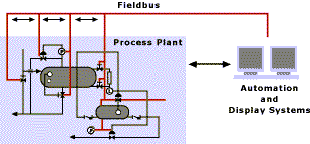
Fieldbus
Foundation Fieldbus ARCHITECTURE
About FOUNDATION Technology
Foundation Fieldbus is a fully digital, serial and bidirectional communication system that connects “Fieldbus” equipment such as sensors, actuators and controllers. Fieldbus is a local area network (LAN) for process control automation and instrumentation, with the ability to distribute control in the field.
Unlike proprietary network protocols, Fieldbus is not owned by any company, or regulated by a single body or nation.
The technology is controlled by the Fieldbus Foundation, a non-profit organization consisting of over 100 of the world's leading control and instrumentation providers and users. Foundation Fieldbus retains many of the operational features of the 4-20 mA analog system, such as a standardized physical wiring interface, single-wire powered devices, and intrinsic safety options, but offers a number of additional benefits to users.

Benefits
Interoperability
With interoperability, a Fieldbus device can be replaced by a similar device with greater functionality from another vendor on the same Fieldbus network, maintaining the original characteristics. This allows users to merge field devices and systems from multiple vendors. Individual Fieldbus devices can also transmit and receive multivariate information, communicating directly with each other over the Fieldbus bus, allowing new devices to be added to the bus without disrupting control.
More Complete Process Data
With Foundation Fieldbus, multiple variables from each device can be brought into the plant's control system for analysis, archiving, trend analysis, process optimization studies and reporting. This access to the most accurate, high-resolution data allows for fine-tuning of the process for better operation, reducing plant downtime. These characteristics allow for greater plant performance and higher profitability.
Expanded view of the process
Modern Fieldbus devices with powerful microprocessor communication allow process errors to be recognized more quickly and with greater certainty. As a result, plant operators are notified of abnormal conditions or the need for preventive maintenance and can make better production decisions. Problems that decrease operational efficiency are corrected more quickly, allowing an increase in throughput while raw material cost and hazardous emissions problems decrease.
Better Plant Safety
Fieldbus technology helps plants maintain increasingly stringent safety requirements. Providing operators with early notification and warning of pending and current hazardous circumstances, Fieldbus allows for corrective action before an unplanned stop. The plant's expanded diagnostic capabilities also reduce the need for frequent access to hazardous areas, thus minimizing risks for field personnel.
Easier Proactive Maintenance
The expanded diagnostic capabilities of field devices make it possible to monitor and record conditions such as valve wear and transmitter clogging. Plant personnel can perform proactive maintenance without waiting for a shutdown, thus avoiding or reducing plant downtime.
Reduction of Wiring and Maintenance Costs
Foundation Fieldbus uses existing wiring and multi-drop connections provide significant savings in installation costs. This includes reductions in intrinsic safety barrier and cable costs, particularly in areas where wiring is already in place. Additional cost savings can be achieved by reducing the time required for construction and start-up, as well as simplifying the programming of control and logic functions using the function blocks built into the devices. According to current estimates, Foundation Fieldbus systems are now in operation in over 25 countries. It is estimated today that approximately 80 percent of all new installations of plant control systems using fieldbus technology are Foundation Fieldbus compliant.








